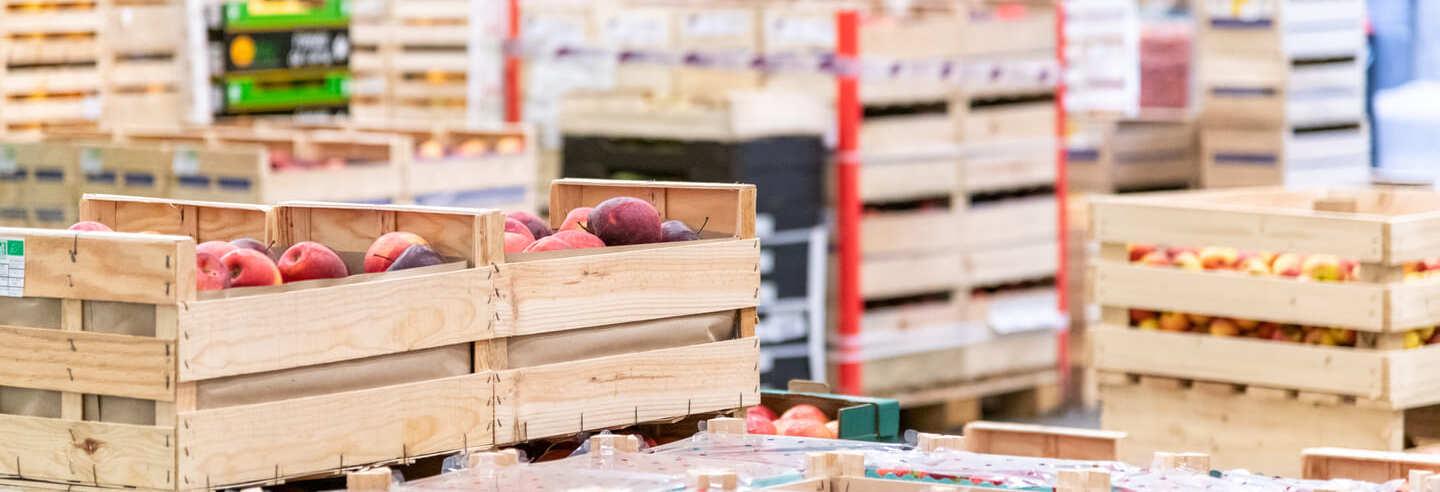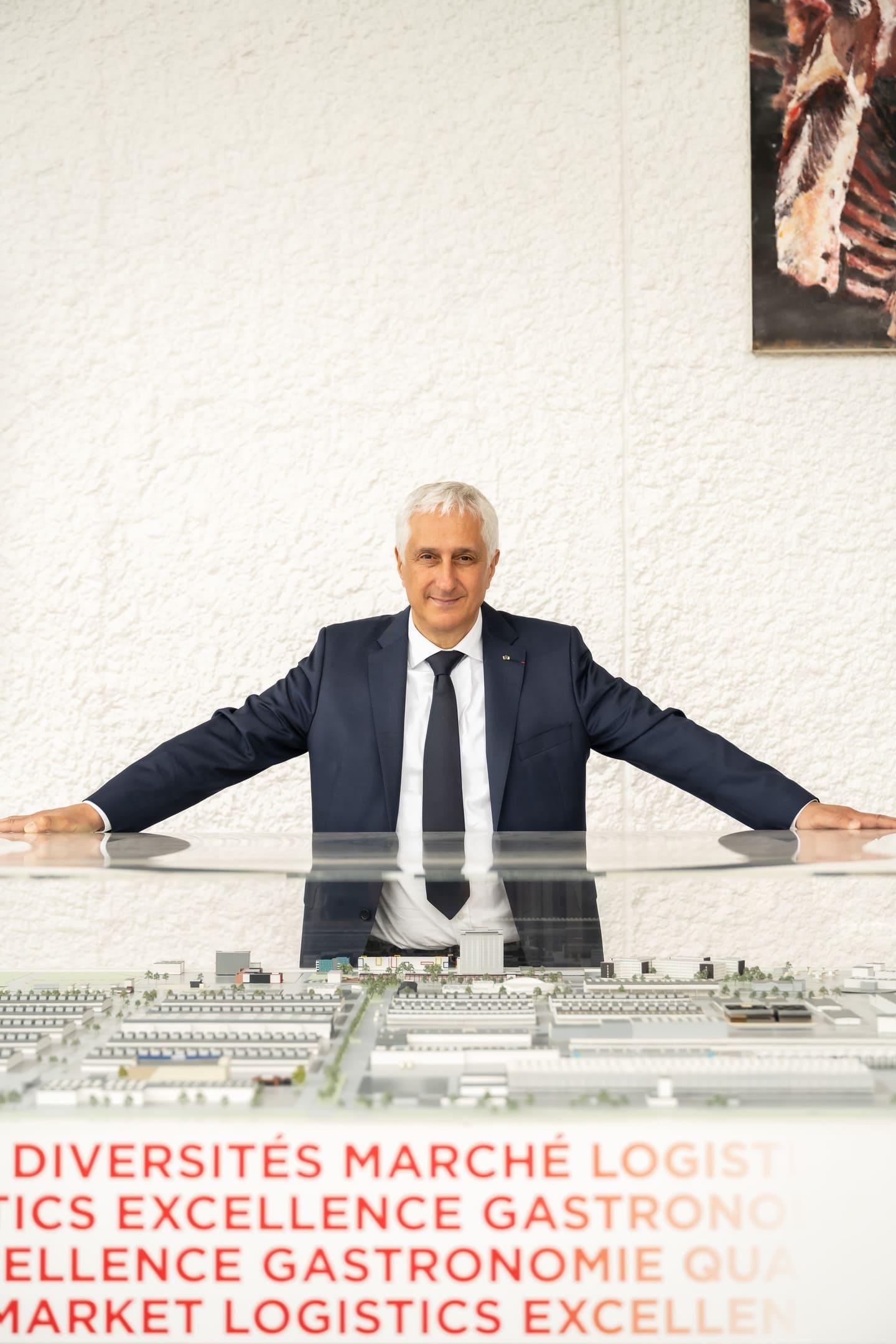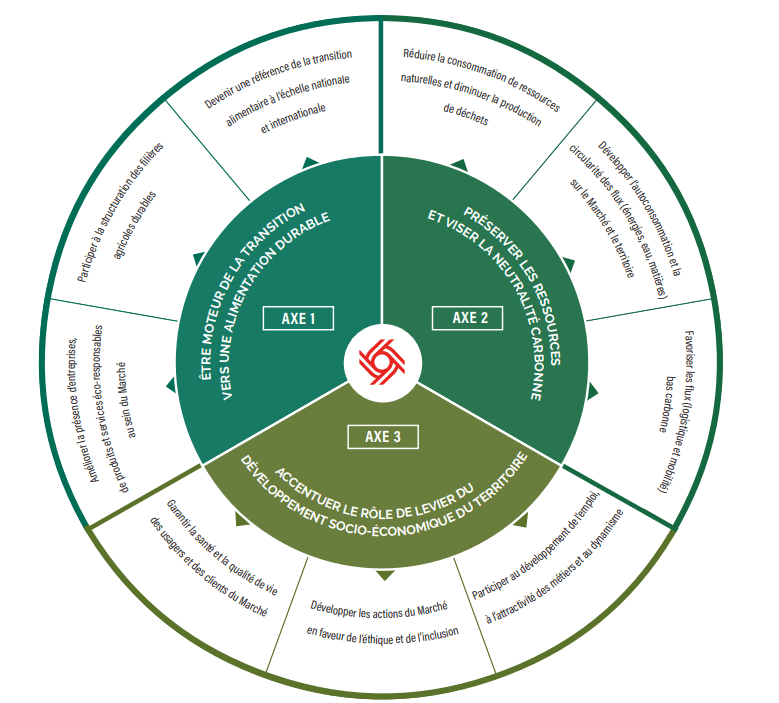

Les engagements du Marché de Rungis en matière de RSE
Respect de l’environnement, réduction des émissions de gaz à effet de serre, transitions vers des modèles alimentaires plus responsables, qualité de vie au travail : la Responsabilité Sociétale des Entreprises, ou RSE, est aujourd’hui au cœur des préoccupations du Marché International de Rungis.
Dans un objectif de durabilité des activités logistiques et de redéfinition des modèles d’alimentation contemporains, la SEMMARIS a mis en place une politique RSE exigeante qui, par le biais d’un plan d’actions concret, inscrit le Marché de Rungis dans une démarche responsable aujourd’hui essentielle à sa pérennité.
Engagements socio-économiques, actions sur le terrain et impulsion de la démarche carbone : découvrez l’avancée de la stratégie RSE mise en place par le Marché de Rungis à l’horizon 2021-2024.
La stratégie RSE 2021-2024 mise en place par la SEMMARIS
Aménager et gérer durablement le Marché International de Rungis avec les opérateurs pour déployer un modèle de distribution responsable, en faveur d’une transition alimentaire durable, de la réduction des impacts environnementaux, et au service du développement des territoires.
Pourquoi la démarche RSE du Marché de Rungis est-elle importante ?
La SEMMARIS souhaite réaffirmer son engagement en faveur de la transition environnementale et sociétale à travers un plan d’actions 2021 – 2024 . La nouvelle politique RSE du Marché de Rungis, c’est une démarche ambitieuse autour de 3 piliers stratégiques, des objectifs à 2024 et 80 actions concrètes.
Depuis 2013, la SEMMARIS mène une politique active en termes de RSE. Un certain nombre d’actions ont été imaginées et déployées avec succès au cours de ces dernières années, en collaboration avec les entreprises du Marché, renforçant la position de Rungis comme acteur engagé sur les sujets du développement durable.
Cependant, dans un contexte où les consommateurs sont de plus en plus sensibilisés aux enjeux de développement durable, le Marché de Rungis doit poursuivre cette dynamique. Ainsi en 2020, la Direction Générale de la SEMMARIS a créé une Direction RSE et Innovation pour structurer et renforcer les initiatives RSE. Un diagnostic complet des actions a été réalisé pour définir une nouvelle stratégie RSE et un plan d’actions ambitieux pour les trois prochaines années.
Citation du Président du Marché

"Notre ambition est de faire du Marché de Rungis un site exemplaire en matière de RSE. De nombreux projets éco-responsables ont déjà été engagés ces dernières années, cette nouvelle stratégie va nous permettre de structurer et de renforcer ces initiatives."
Stéphane LAYANI
Une stratégie qui concerne tous les secteurs d’activités du MIN
Ce plan stratégique défini autour de trois axes forts et des engagements, devra répondre aux enjeux prioritaires de nos parties prenantes et engager le Marché de Rungis dans la transition écologique :
- Etre le moteur de la transition vers une alimentation durable
- Préserver les ressources et viser la neutralité carbone
- Accentuer le rôle de levier du développement socio-économique du territoire
Les objectifs définis précisément
La stratégie RSE du Marché de Rungis, c’est un ensemble de 80 actions concrètes définies selon une liste de 9 engagements répartis en 3 piliers fondateurs qui donnent au projet RSE de la SEMMARIS sa direction, ces actions ont été décidées suite à des études opérationnelles minutieuses, des diagnostics techniques et des consultations interprofessionnelles qui donnent à cette démarche un fondement concret et une efficacité mesurable.

Les 3 piliers de la démarche RSE du Marché de Rungis
1. Être moteur de la transition vers une alimentation durable
Retranscription textuelle de la vidéo
Multiplication des entreprises, services et produits écoresponsables sur le Marché, impulsion d’une transition alimentaire globale et structuration des filières agricoles : voici les engagements qui font du Marché de Rungis un moteur de la transition vers une alimentation durable.
Quelques exemples des actions du plan mises en place dans le cadre de ce premier pilier d’engagement :
- la création du Label Rungis, un gage de qualité qui encourage les acteurs du Marché à l’excellence ;
- l’implantation d’un modèle de production locale propice à la redéfinition des pratiques d’alimentation contemporaines, notamment dans le cadre du projet Agoralim ;
- le renforcement du dispositif Rungis & Co, l’incubateur du Marché de Rungis aujourd’hui profitable à 50% de start-ups à impact ;
- la rédaction d’une charte d’engagement à destination des futurs opérateurs du Marché, pour les inciter dès le départ à adopter les bons réflexes ;
- La revalorisation de plus de 1600 T d'invendus alimentaires par un réseau de plus de 40 associations et dont notamment le Potager de Marianne, implanté directement sur le Marché.
2. Préserver les ressources et viser la neutralité carbone
Retranscription textuelle de la vidéo
En réduisant la consommation de ressources naturelles et diminuant la production de déchets, en favorisant l’autoconsommation énergétique via la circularité des flux et en encourageant les activités bas carbone, le Marché de Rungis compte ainsi remplir ce deuxième objectif de préservation des ressources et de neutralité carbone.
Tout cela passe par des actions telles que :
- la mise en place, dès l’origine du Marché, d’un réseau de chauffage vertueux autoalimenté par la combustion des déchets ;
- l’investissement dans des véhicules bas carbone et la mise en place, dans l’enceinte du Marché, de bornes de recharge à destination des véhicules électriques ;
- l’organisation de groupes de travail logistiques pour mener des actions de sensibilisation et ainsi responsabiliser les processus d’action à toutes les étapes de la supply chain ;
- l’installation de dispositifs photovoltaïques sur les bâtiments du Marché et sous forme d’ombrières ;
- la réorganisation de l’activité ferroviaire avec la création d'un nouveau terminal multimodal à horizon 2026.
3. Accentuer le rôle de levier du développement socio-économique du territoire
Pour accentuer son rôle de levier du développement socio-économique du territoire, le Marché de Rungis s’engage à garantir la santé et la qualité de vie de ses usagers, à développer ses actions en faveur de l’éthique et de l’inclusion et à participer au développement de l’emploi et de l’économie du territoire francilien.
Dans cette optique, la SEMMARIS travaille à la mise en place des actions suivantes :
- réalisation d’un diagnostic Qualité de Vie au Travail (QVT) auprès des salariés du Marché de Rungis ;
- organisation d'événements et mise en place de dispositifs en faveur de l’insertion des travailleurs atteints de handicap ;
- promotion de l’engagement associatif via le dispositif d’arrondi sur salaire microDON ;
- surveillance de la parité aussi bien dans les actions de rémunération que de recrutement.
En 2025, le Marché de Rungis a obtenu la note de 99/100 selon l’Index Egapro au titre des données 2024 (versus 97/100 en 2023).
| Détails de l’index EGA PRO SEMMARIS |
|---|
| Indicateur d’écart de rémunération: 39/40 |
| Pourcentage de salariés ayant bénéficié d’une augmentation dans l’année suivant leur retour de congé maternité : 15/15 |
| Indicateur d’écart de taux d’augmentations individuelles : 20/20 |
| Indicateur d’écart de taux de promotion : 15/15 |
| Nombre de salariés du sexe sous-représenté parmi les 10 plus hautes rémunérations : 10/10 |
Zoom sur la démarche carbone du Marché de Rungis
La neutralité carbone, c’est ce que vise le Marché de Rungis à l’horizon 2050. Pour atteindre cet objectif, la SEMMARIS a mis en place une stratégie carbone applicable à toutes les échelles de la chaîne d’approvisionnement du Marché, du transport des marchandises en amont à la gestion des déchets en passant par la consommation électrique des bâtiments.
La démarche de neutralité carbone du Marché de Rungis repose sur 2 actions concrètes :
- Identifier les activités fortement émettrices de gaz à effet de serre ;
- Mettre en place un plan de réduction des émissions concret et déclinable à l’ensemble des activités du Marché.
Pour réduire, d’ici 2030, les émissions de gaz à effet de serre du Marché de Rungis de 30%, la SEMMARIS a identifié, sur son périmètre, 5 domaines d’actions prioritaires que sont :
- la gestion et le traitement des déchets ;
- la réduction des fuites de fluides frigorigènes au niveau de la chaîne du froid ;
- la construction et la rénovation des bâtiments ;
- la consommation énergétique du Marché et de ses acteurs ;
- les déplacements pendulaires et professionnels dans l’enceinte du Marché.
Chiffres clés
1 560
TONNES DE DONS RÉCOLTÉS PAR LES ASSOCIATIONS D’AIDES ALIMENTAIRES
97/100
SCORE DE L’INDEX ÉGALITÉ FEMMES-HOMMES
- 8 %
DE TONNAGES DE DÉCHETS GÉNÉRÉS SUR LE MIN
40
START-UP INCUBÉES EN 2022 DONT 50 % À IMPACT POSITIF